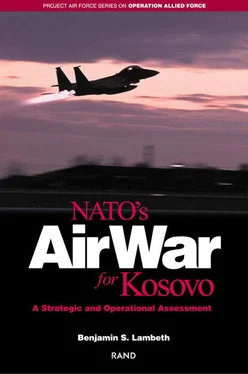NATO’S AIR WAR IN PERSPECTIVE
Operation Allied Force was the most intense and sustained military operation to have been conducted in Europe since the end of World War II. It represented the first extended use of military force by NATO, as well as the first major combat operation conducted for humanitarian objectives against a state committing atrocities within its own borders. It was the longest U.S. combat operation to have taken place since the war in Vietnam. At a price tag of more than $3 billion, it was also a notably expensive one. Yet in part because of that investment, it turned out to have been an unprecedented exercise in the discriminate use of force on a large scale. In all, out of some 28,000 high-explosive munitions expended over the operation’s 78-day course, no more than 500 noncombatants died as a direct result of errant attacks.
After the bombing ended, the predominant tendency among most outside observers was to characterize that effort as a watershed achievement for air power. Yet with all due respect for the unmatched professionalism of the aircrews who actually carried out the air war, it is hard to accept that characterization as the proper conclusion to be drawn from Allied Force. To be sure, there is much to be said of a positive nature about NATO’s air war for Kosovo. To begin with, it did indeed represent the first time in which air power coerced an enemy leader to yield with no friendly land combat action whatsoever. This does not mean that air power can now “win wars alone” or that the air-only strategy ultimately adopted by NATO’s leaders was the wisest choice available to them. Yet the fact that air power prevailed on its own despite the multiple drawbacks of a reluctant administration, a divided Congress, an indifferent public, a potentially fractious alliance, a determined opponent, and—not least—the absence of a credible NATO strategy surely testified that the air instrument has come a long way in recent years in its relative combat leverage compared to that of other force elements in joint warfare.
The two most important accomplishments of the air war occurred at the strategic level and had to do with the performance of the alliance as a combat collective. First, despite the suggestion of some critics to the contrary, NATO clearly prevailed over Milosevic. Although NATO’s air strikes were unable to halt Milosevic’s ethnic cleansing campaign before it had been essentially completed, they did succeed in completely reversing its effects in the early aftermath of the cease-fire by forcing Milosevic to accept NATO’s demands. Second, NATO showed that it could operate successfully under pressure as an alliance, even in the face of constant hesitancy and reluctance on the part of many of the member states’ political leaders. For all the air effort’s fits and starts and the manifold frustrations they caused, the alliance earned justified credit for having done remarkably well in a uniquely challenging situation. In seeing Allied Force to a successful conclusion, NATO did something that it had been neither created nor configured to do.
Despite these accomplishments, there were enough disappointments to suggest that instead of basking in the glow of air power’s successful performance, air warfare professionals should give careful thought to the hard work that still needs to be done if air power’s fullest potential in joint warfare is to be realized. As with the operation’s successes, the biggest failings of Allied Force occurred in the realm of strategy and execution. First, despite its successful outcome and through no fault of allied airmen, the bombing effort was a suboptimal application of air power. The incremental plan chosen by NATO’s leaders risked squandering much of the capital that had been built up in air power’s account ever since its success in Desert Storm nearly a decade before. Almost without question, the first month of underachievement in the air war convinced Milosevic that he could ride out the NATO attacks. Indeed, the way Operation Allied Force commenced violated two of the most enduring axioms of military practice: the importance of achieving surprise and the criticality of keeping the enemy unclear as to one’s intentions. The acceptance by NATO’s leaders of a strategy that ruled out a ground threat from the very start and envisaged only gradually escalating air strikes to inflict pain was a guaranteed recipe for downstream trouble, even though it was the only strategy that, at the time, seemed politically workable.
Although the manner in which the air war was conducted fell short of the ideal use of air power, it suggested that gradualism may be here to stay if U.S. leaders ever again intend to fight with coalition partners for marginal or amorphous interests. Insofar as gradualism promises to be the wave of the future, it suggests that airmen will need to discipline their natural inclination to bridle whenever politicians moderate the application of a doctrinally pure campaign strategy and to recognize and accept instead that political considerations, after all, determine—or should determine—the way in which campaigns and wars are fought. This does not mean that military leaders should surrender to political pressures without first making their best case for using force in the most effective and cost-minimizing way. It does, however, stand as an important reminder that war is ultimately about politics and that civilian control of the military is an inherent part of the democratic tradition. Although air warfare professionals, like all other warfighters, are duty-bound to try to persuade their civilian superiors of the merits of their recommendations, they also have a duty to live with the hands they are dealt and to bend every effort to make the most of them in an imperfect world. It follows that civilian leaders at the highest levels have an equal obligation to try to stack the deck in such a way that the military has the best possible hand to play and the fullest possible freedom to play it to the best of its ability. This means expending the energy and political capital needed to develop and enforce a strategy that maximizes the probability of military success. That was not done by the vast majority of the topmost civilian leaders on either side of the Atlantic in Allied Force.
On the plus side, the operation’s successful outcome—despite its many frustrations—suggests that U.S. air power may now have become capable enough to underwrite a strategy of incremental escalation irrespective of that strategy’s inherent inefficiencies. What made the gradualism of Allied Force more bearable than that of the earlier war in Vietnam was that NATO’s advantages in stealth, precision standoff attack, and electronic warfare meant that it could fight a one-sided war against Milosevic with near-impunity and achieve its desired result, even if not in the most ideal way. That was not an option when U.S. air power was a less developed tool than it is today.
One of the most important realizations to emerge from Allied Force had to do with the opportunity costs incurred by NATO’s anemic start of its air attacks without an accompanying ground threat. They included the following:
• A failure to exploit air power’s inherent shock potential and to instill in Milosevic an early fear of worse consequences yet to come.
• The encouragement the initial lack of a NATO ground threat gave enemy troops to disperse and hide while they had time.
• The virtual carte blanche that lack gave Milosevic for accelerated atrocities in Kosovo.
• The relinquishment of the power of the initiative to the enemy.
These problems identified by the Allied Force experience suggest an important corrective to the unending argument between airmen and land combatants over the relative combat merits of air power versus “boots on the ground.” Although Allied Force reconfirmed that friendly ground forces no longer need to be inexorably committed to combat early, it also reconfirmed that air power in many cases cannot perform to its fullest potential without the presence of a credible ground component in the overall allied strategy.
Читать дальше












